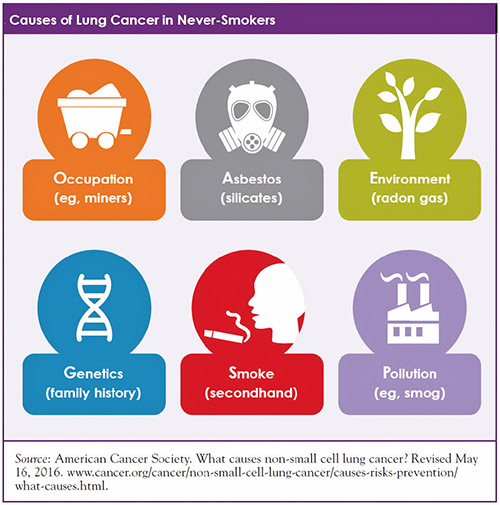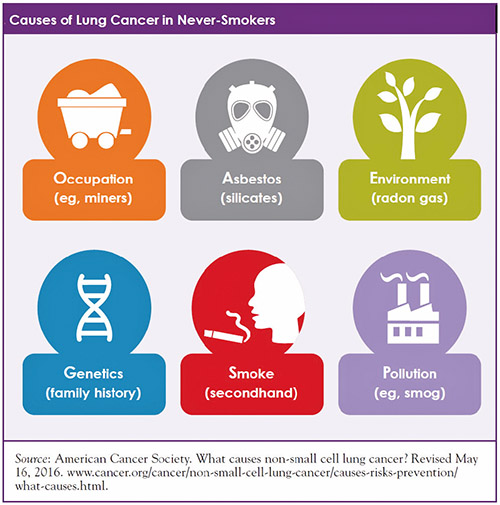
(Courtesy of SMGH) “November is National Lung Cancer Month, and I can hear it now,” said George Matyjewicz, PhD, community liaison at St. Mary’s General Hospital. “‘I don’t smoke and never have, so it’s of no interest to me.’ That might be what you think, but the facts speak for themselves.1 Lung cancer in people who don’t smoke can be caused by secondhand smoke, air pollution, exposure to radon,2 workplace exposures to asbestos, diesel exhaust or certain other chemicals or other factors. Or it can be simply your genes!”
Lung cancer in people who don’t smoke tends to develop in younger people and often has certain gene changes that are different from those in tumors found in people who smoke. Scientists know how some of the risk factors for lung cancer can cause certain changes in the DNA of lung cells. These changes can lead to abnormal cell growth and, sometimes, cancer.
Genes do seem to play a role in some families with a history of lung cancer. For example, people who inherit certain DNA changes in a particular chromosome (chromosome 6) are more likely to develop lung cancer, even if they don’t smoke or only smoke a little. Some people seem to inherit a reduced ability to break down or get rid of certain types of cancer-causing chemicals in the body, such as those found in tobacco smoke. This could put them at higher risk for lung cancer.
Lung cancer is the leading cause of cancer deaths in the U.S., and despite its undeniable impact on our nation, the disease often remains in the shadows. It is estimated that over 235,000 Americans will be diagnosed with lung cancer this year. Approximately 14.2 million Americans qualify as high risk for lung cancer and are recommended to be screened. In March of 2021, the U.S. Preventive Services Task Force updated the lung cancer screening eligibility guidelines, lowering the age for eligibility to 50 (from 55) and the pack years smoked to 20 (from 30).3 Despite this tremendous potential to save lives, only about 5% of those eligible have been screened.
Raising awareness about this relatively new cancer screening technique is critical to saving lives. Lung cancer kills more people every year than breast, prostate and colon cancers combined! Many times, symptoms do not present themselves until the cancer has progressed to later stages. However, when caught early, the survival rates increase substantially.
“We know of a 75-year-old man who was recently diagnosed with lung cancer,” said Matyjewicz. “He developed a new cough that didn’t want to go away and then shortness of breath. He doesn’t like doctors, and friends and family had to convince him to get examined. The results: Stage 4 lung cancer. He was hospitalized and recently was moved to a hospice, which is his last stage of life.”
The 2021 Lung Health Barometer surveyed4 a nationally representative sample of 4,000 women and men about their awareness and understanding of lung cancer. Survey findings revealed that: 29% of Americans know that lung cancer is the leading cancer killer of women and men, yet 69% of adults have not spoken with their doctor about their risk for lung cancer, and 44% are concerned they might get the disease. Only 36% of respondents knew that lung cancer screening is now available for early detection of the disease.
At the turn of the last century there were three hospitals in Passaic and one of them, Passaic Beth Israel Hospital (PBI), was a leader in treating cancer, with a respected center of excellence in oncology. Through a series of mergers and buyouts, PBI became St. Mary’s General Hospital, part of the Prime Healthcare network. Prime has invested over $85 million in St. Mary’s General, part of which was to improve their already excellent Cancer Center that offers the full scope of cancer care, beginning with early testing; best-in-class equipment and treatment protocols; and personal support.
Obviously, cancer screening is the first step in this process, since early detection often offers the best hope for successful treatment. Through diagnostic and screening technologies, our experts are able to spot cancer and monitor the effects of treatment. Our center treats all types and stages of cancer. Some of the modalities used at St. Mary’s General include: PET/CT, traditional and breast magnetic resonance imaging (MRI), nuclear medicine, colonoscopy, 3-D mammography, breast ultrasound and stereotactic breast biopsy.
Once diagnosing a patient with cancer, our acclaimed oncology team provides the best possible outcomes, using diagnostic and screening technology, radiation oncology, surgery and inpatient care. Our cancer-fighting arsenal includes the state-of-the-art TrueBeam® Radiotherapy System, which offers patients treatment that is powerful and precise, minimizing damage to surrounding tissue and in some cases offering treatment in less than five visits.
The system enables your clinical team, led by an expert radiation oncologist, to treat your cancer without surgery using powerful, state-of-the-art radiotherapy individualized for your condition. During the treatment, the beam damages cancerous cells while minimizing the exposure of nearby healthy tissues, and patients don’t feel a thing—it is completely painless, and the amount of radiation is the same as getting a regular x-ray.
St. Mary’s General provides many other radiation therapy options, including the most advanced procedures and treatment technology available—RapidArc® volumetric arc therapy, intensity-modulated radiation therapy (IMRT), and image-guided radiation therapy (IGRT).
In addition, the St. Mary’s General Hospital team includes excellent hematology oncology specialists in the diagnosis and treatment of cancers of the blood and lymphatic system. We also boast one of the highest-quality breast surgeons in the area along with a chemotherapy/infusion unit so compassionate that survivors actually come back to visit.
Now’s the time to get tested. Call your physician now and get a script and then call 973-365-4450 to schedule a mammogram or sonogram.
To learn more visit us at: https://www.smh-nj.com/our-services/cancer-center/ or to make an appointment please call: 973-365-4450, or email [email protected]. For a lung cancer screening please call: 973-365-4359 or email [email protected].
St. Mary’s General Hospital—nationally recognized, locally preferred—among the top hospitals in America for health, quality, and patient safety. A center of excellence for maternal-child, the hospital has over 550 physicians and 1,200 employees, with every staff member committed to providing respectful, personalized, high-quality care—to satisfy patients’ needs and exceed their expectations. St. Mary’s General is a proud member of Prime Healthcare, which has had more Patient Safety Excellence Award recipients for five consecutive years (2016-2020) than any other health system in the country, including a “Top 15 Healthcare System” by Truven Health Analytics. To learn more about St. Mary’s General Hospital, visit https://www.smh-nj.com/ or Facebook at https://www.facebook.com/StMarysGeneral.
For more information, please contact George Matyjewicz, PhD, community liaison at [email protected]
1 https://www.cancer.org/cancer/lung-cancer/causes-risks-prevention/what-causes.html “Causes in People Who Don’t Smoke,” American Cancer Society.
2 Radon is the second leading cause of lung cancer after cigarette smoking. If you smoke and live in a home with high radon levels, you increase your risk of developing lung cancer. Having your home tested is the only effective way to determine whether you and your family are at risk of high radon exposure.
3 https://tinyurl.com/w8634d38
4 https://www.lung.org/lung-force/lung-health-barometer













